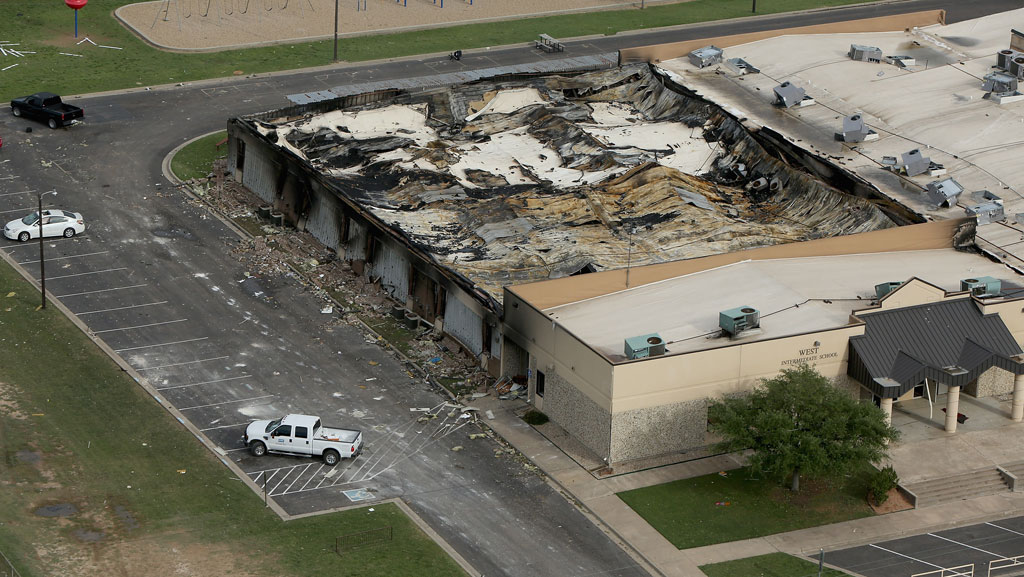DALLAS (AP) After a massive fertilizer plant explosion devastated this rural town in April, local teachers and administrators did what they could to help the community cope with a disaster that killed 15 people and wrecked hundreds of structures, including three of West's four schools. They borrowed classrooms in a nearby town so that children could return to class, and salvaged the school year so that the 113 high school seniors could graduate on time.
But now West's schools are confronting another challenge as they plan to begin the new term next month in clusters of trailers that some are already calling "Portable City."
It's not clear how temporary the prefab village will actually be. Federal officials have rejected the town's $40 million disaster aid request and insurance companies have offered just $20 million of the estimated $59 million value of the schools' insurance policy.
Leaders of the town of 2,800 worry about the impact of the schools' uncertainty on hundreds of residents who are deciding where to rebuild their lives in West or possibly elsewhere.
"Delaying it another year is not going to do any good as far as morale goes, for the community and for our kids," said Superintendent Marty Crawford.
Parents are wondering about the schools' future, and the town's.
"You want to be home. You want that sense of normalcy," says Crystal Anthony, a school board member and the mother of a rising ninth grader who has been living in nearby Waco since the blast destroyed her house. For some, she said, moving somewhere else might be easier, but Anthony said she intends to stay in West and rebuild.
Until the night of April 17, West was a town of quiet streets best known for its kolaches and other Czech pastries, reflecting the heritage of the immigrant farmers who settled the area a century ago. Most residents went through the West schools and work on the surrounding farms and ranches, or commute to jobs in Waco, or even the Dallas-Fort Worth area an hour away.
Many of those families are still displaced, living in surrounding towns and grappling with insurance payouts that still leave them with heavy unmet costs.
In addition to destroying 200 houses and buildings, the blast at the West Fertilizer Co., which occurred after a fire ignited explosive chemicals, blew out the windows and ceilings in the intermediate school next door, and caved in part of the high school and middle school a short walk away.
Since the end of the school year, school officials have concentrated on being able to resume classes in town in the fall.
Demolition has started on the middle school grounds, and dozens of trailers have been ordered for a makeshift campus for the middle and high school grades. The high school football field, which became a triage center the night of the blast, with blood and needles left behind, is being re-sodded so the West Trojans can play their season.
Officials acknowledge they have a long way to go.
"August 26 is still going to be a great day," Crawford said.
How they will get permanent schools again is another matter. They are tens of millions of dollars short.
Town officials say a tax increase is almost out of the question with so many residents struggling with costs for their damaged houses. A bond issue may also be difficult given the uncertain tax base. Gov. Rick Perry said Saturday that $10 million from a $15 million state emergency funding bill will be directed to West. That money will be used for infrastructure purposes, such as rebuilding the town's water and sewer lines that aren't working after the blast.
Crawford said he was still talking with federal officials and the district's insurer, "but we sure would hate to promise something and not be able to deliver."
State schools spokeswoman Debbie Ratcliffe said there was nothing "in the normal funding formula that would provide funding for West."
In many ways, the school system is going through the same struggle to rebuild as many parents who want to be back in their houses.
Nickole Hayes, the mother of triplets who will be juniors this fall, said getting her daughters back to school in town would be a step forward even if it came with hardships. Hayes and her family are living in Hillsboro, 15 miles away, as they try to figure out how to rebuild their destroyed home, and when it would get electricity and drinkable water.
She's heard from others who also want to come back to West if at all possible.
"It's a choice to be made, and this is the best one. If the kids want to be there, and they do, then this is it," she said.


